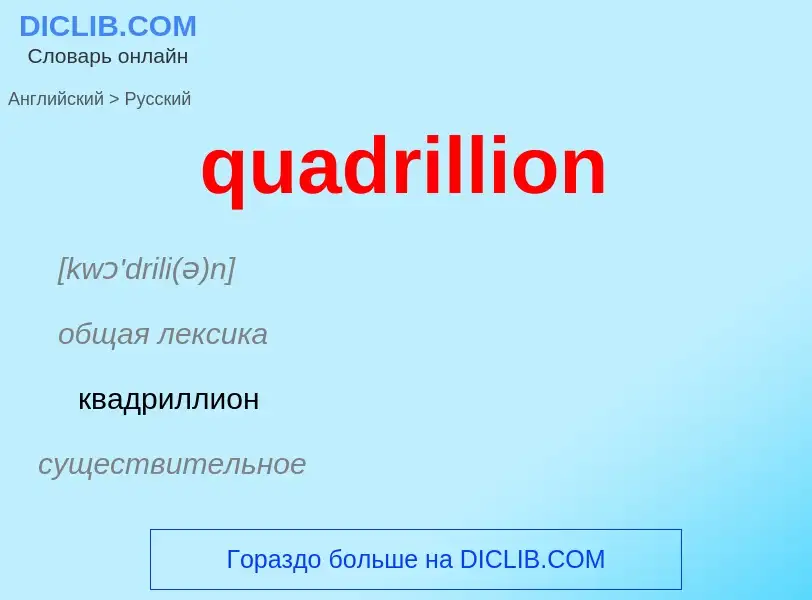Μετάφραση και ανάλυση λέξεων από την τεχνητή νοημοσύνη ChatGPT
Σε αυτήν τη σελίδα μπορείτε να λάβετε μια λεπτομερή ανάλυση μιας λέξης ή μιας φράσης, η οποία δημιουργήθηκε χρησιμοποιώντας το ChatGPT, την καλύτερη τεχνολογία τεχνητής νοημοσύνης μέχρι σήμερα:
- πώς χρησιμοποιείται η λέξη
- συχνότητα χρήσης
- χρησιμοποιείται πιο συχνά στον προφορικό ή γραπτό λόγο
- επιλογές μετάφρασης λέξεων
- παραδείγματα χρήσης (πολλές φράσεις με μετάφραση)
- ετυμολογία
quadrillion - translation to ρωσικά
[kwɔ'drili(ə)n]
общая лексика
квадриллион
существительное
общая лексика
единица энергии
эквивалентная квадрильону британских тепловых единиц (или количеству теплоты, получаемому от сжигания 24 млн. т нефти)
математика
септильон (
квадрильон, миллион в четвертой степени (единица с 24 нулями)
американизм
квадрильон (
тысяча в пятой степени (единица с 15 нулями)
[di'siljən]
существительное
общая лексика
дециллион (1060
[амер.]
Ορισμός
Βικιπαίδεια
Two naming scales for large numbers have been used in English and other European languages since the early modern era: the long and short scales. Most English variants use the short scale today, but the long scale remains dominant in many non-English-speaking areas, including continental Europe and Spanish-speaking countries in Latin America. These naming procedures are based on taking the number n occurring in 103n+3 (short scale) or 106n (long scale) and concatenating Latin roots for its units, tens, and hundreds place, together with the suffix -illion.
Names of numbers above a trillion are rarely used in practice; such large numbers have practical usage primarily in the scientific domain, where powers of ten are expressed as 10 with a numeric superscript.
Indian English does not use millions, but has its own system of large numbers including lakhs and crores. English also has many words, such as "zillion", used informally to mean large but unspecified amounts; see indefinite and fictitious numbers.


